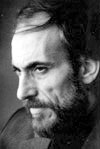 Actor Ghassan Massoud has appeared in numerous films in his native Syria, including "The Chant of Rain." He sat down with Rhonda Roumani, Beliefnet's former Islam editor now based in Damascus, to discuss his "Kingdom of Heaven" role as Saladin--a revered 12th-century Muslim leader who fought Christian crusaders.
Actor Ghassan Massoud has appeared in numerous films in his native Syria, including "The Chant of Rain." He sat down with Rhonda Roumani, Beliefnet's former Islam editor now based in Damascus, to discuss his "Kingdom of Heaven" role as Saladin--a revered 12th-century Muslim leader who fought Christian crusaders.What did you learn from working with director Ridley Scott on "Kingdom of Heaven"?
He's a very educated man. He was able to understand me easily. I was surprised when I found that he knew so much about Saladin, Islam, about Arabs.
How did he want you to portray Saladin?
He wanted Saladin to appear more like a statesman, more like a gentleman than a fighter with muscles. Scott wanted to say we can live in this world together by dialogue, not by fighting, not by fanatics. This is the most important part of the film.
How did you prepare for the role of Saladin?
I read hundreds and hundred of pages on Saladin to prepare for the role. And I read many historians' viewpoints. This all helped me to get a very clear image in my mind of what Saladin was about-his positive and negative attributes.
Then, to get into the Saladin mood, I forgot about everything that I read, because in acting, everything that you read has to live in your mind.
[Saladin] had to cleanse his mind for battles and had to decide how to make terms with the enemy, how to discuss matters with them, how to control his troops around the Arab world. I think he must have been cool, not nervous. And a good thinker. That's how I portrayed him.
Everything in Saladin's own life is also my philosophy. My culture is that of Saladin. He has been a role model for us since our youth. Saladin was an example of the Muslim hero who returned to Arabs and Muslims their pride and their dignity. He is an example for our people, our leaders, our society.
The sensitive point here is about Jerusalem. He was able to return Jerusalem to Arab Muslims and Christians because Jerusalem has [holy sites] for Muslims and Christians.
If we are to benefit from Saladin's example, we have to create a dialogue between these civilizations. He used to respect his enemy, and I think many of the crusader leaders respected Saladin. Hundreds of European knights, soldiers, troops, and cavalries respected him as a noble enemy.
Who is today's Saladin?
You cannot compare this time to the time of Saladin. In the time of Saladin, the majority of the region [was] under Saladin. There were not countries. Now, who is the great Arab leader thinks or leads the ummah [community]? We don't have one.
America is formulating its politics to divide the divided and weaken the weak. I want America to understand that the formula for democracy does not work for Syria and the Arabs. If reform is necessary for the people, it is different from the American reform. We as a society are waiting for a program for Syrian reforms, but we want it to happen on Syrian terms, by Syrian means, not American means.
What was your impression of the situation in the U.S. and in the West?
The West-I went there. There is a bad image of Muslims and Arabs after Sept 11. But the actors and the artists, they deal with you as an artist, not as a terrorist. They used to welcome me with a lot of humility. I was there to give the West a good image of Islam, about Arabs, and about Saladin. Now that they have this information, they need to make revisions about their information about Arabs and Islam.
We (Arabs, Syrians) can distinguish between the American administration and the American people. So, for me, there were no surprises because the people are very sweet.
I hope that the U.S. public will change their viewpoint towards Syria. As a people, as a country, we love cinema and poetry and music. We love life. And we want to live our life in our way. And I hope they respect this wish.
If Saladin was here, what might he have done today?
If Saladin were here, he would not have at least [allowed] Bush to destroy the feeling of humanity between people. Maybe he would have used the media and would have been able to war against George Bush with the media. We loved Bill Clinton here in the area. Why? He was a musical man, he played the saxophone. He was an educated man leading the world. He was a peaceful man. He did not like war and fighting and the clashes between states and civilizations.
Are you a believer?
I think I am a believer. I am a believer-why not? I am on a path, but I cannot explain it.

